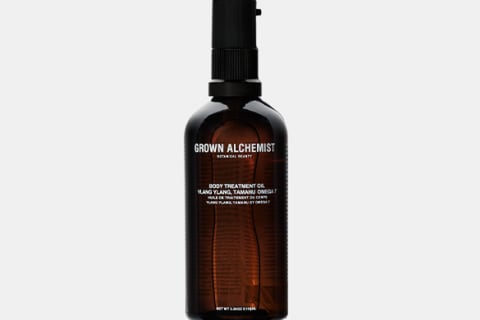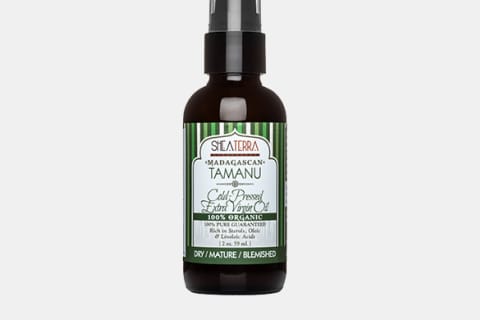Advertisement
This Lesser-Known Oil Is The Ultimate Ingredient For Acne-Prone Skin

OK, so at this point we've espoused the good word that acne or oil-prone skin folks don't need to shy away from oils: Yes, we know noncomedogenic oils do no harm to pores. That being said, there are some oils that are certainly better than others if you do have acneic skin.
One of these oils that has acne-fighting and moisturizing properties (plus a slew of other skin-healthy benefits) might not be as well known as, say, jojoba oil—but it's worth a spot in your beauty lexicon nonetheless.
Its name is tamanu oil, and it's bound to become your next favorite ingredient. Behold, our tamanu oil guide, plus exactly how to use it for glowing, clear skin.
What is it?
Tamanu oil is extracted from the seeds of the tamanu nut tree (technically a type of evergreen, called calophyllum inophyllum, found in the South Pacific). The oil—along with bark and leaves—has been touted for centuries in African, Asian, Polynesian, and Pacific Island cultures.
According to cosmetic chemist Ron Robinson, founder of BeautyStat, it's an emollient (meaning it fills in microcracks in the skin), and it "might have anti-inflammatory, antibacterial, and antimicrobial activities."
Benefits of tamanu oil.
While its numerous uses transcend the beauty space, many swear by tamanu oil especially for its skin-healthy benefits. We've highlighted a few below:
- Helps with acne: Unlike other comedogenic oils (looking at you, coconut), tamanu oil shouldn't clog pores. Better yet, it has some acne-fighting properties: "It has some antibacterial activity against P. acnes1, the bacteria associated with acne, so it is a safe moisturizing oil to use on acneic skin," says board-certified dermatologist Loretta Ciraldo, M.D., FAAD, founder of Dr. Loretta Skincare.
- Anti-inflammatory: On a similar note, tamanu oil has impressive anti-inflammatory properties, which is especially helpful for those painful pustules and pimples, as well as inflammatory conditions like eczema.
- Moisturizing: Like other high-caliber oils, tamanu helps seal in hydration on the skin. It also has a fair share of fatty acids—like oleic and linoleic acid—to feed the skin barrier with healthy lipids.
- Promotes cell turnover: Tamanu oil has wound-healing and skin-regenerating capabilities, and one study even shows that the oil encourages the growth of new skin cells—all of which are helpful for fading acne scars and hyperpigmentation, as well as promoting an all-around glow.
- Supports healthy skin aging: "It is reported to help protect skin from UV-induced damage, promote glyco-amino-glycan production2 (the most common of these is hyaluronic acid), and help support collagen," says Ciraldo.
How do you use it?
Tamanu oil is super versatile. You can find it in a number of face and body oils, moisturizers, and serums (even a hair care product or two). But according to Robinson, tamanu is quite the triple threat in skin care: "It can be used in a mask, moisturizer, or spot treatment," he says.
For a mask, simply mix the tamanu oil with another hydrating base ingredient (like Manuka honey or aloe) and slather on for a few minutes before rinsing with lukewarm water. Or, if a moisturizer is more your jam, mix a couple of drops of tamanu oil into your favorite cream or facial oil (or find one that has tamanu oil already, like our recs below) and massage it into your skin.
Even if you opt for the spot treatment, you'll still want to dilute tamanu with another carrier oil before dabbing on troublesome areas. Its antimicrobial properties do make it an impressive remedy for blemishes, but it's quite potent—similar to, say, tea tree oil.
Are there any side effects?
Here's one thing to know about tamanu oil: According to Ciraldo, it's best used at low concentrations, lest you experience some irritation or redness. You're probably fine to use it in skin care formulations (as these typically come buffered with other hydrating ingredients), but if you do choose to snag straight tamanu oil (organic and cold-pressed, always), you might want to start with a few drops and work your way up.
Acupuncturist and herbalist Antonia Balfour, LAc, seconds the warning: "I find it to be a very 'active' oil and can be irritating to some when used in its pure form," she's told us. "I always recommend diluting it at 50% with a carrier oil such as almond oil, olive oil, or sunflower oil."
Of course, if you have a tree nut allergy, steer clear of tamanu altogether. Remember: The oil is extracted from the seeds.
The takeaway.
Tamanu oil isn't your average cleansing or moisturizing oil. It actually has skin-clearing benefits and has been celebrated for years in traditional medicine. Although, if you are going to try tamanu, make sure you're diluting it properly before slathering it on—this unique oil may be mightier than the rest.


